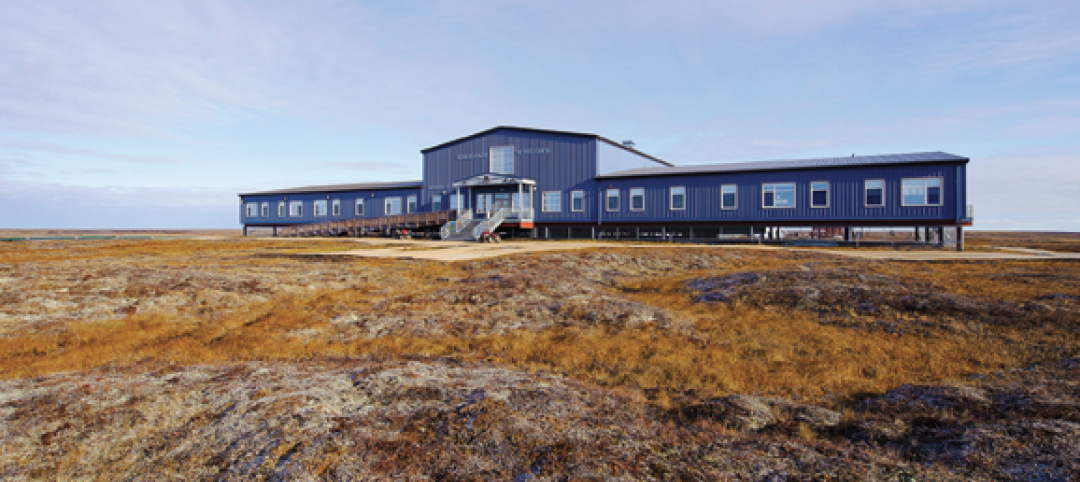The U.S. Department of Energy today announced the release of the first in a new series of Advanced Energy Design Guides (AEDGs) to aid architects and engineers in the design of highly energy-efficient office buildings. The 50% AEDG series will provide a practical approach to commercial buildings designed to achieve 50% energy savings compared to the commercial building energy code used in many areas of the country. This 50% AEDG for Small and Medium Office Buildings is the first in a series of four to be released in the coming months. These commercial building guides support President Obama’s goal to reduce energy use in commercial buildings 20% by 2020 and will help drive demand for energy-saving products made in the United States.
Not only will these guides help builders achieve performance beyond the current energy code, but they will also provide recommendations detailing how designers can incorporate available technology to achieve these savings. The guides help architects and engineers choose energy-efficient designs for daylighting, building envelope assemblies, and heating and cooling systems, among other technologies. The guides also recommend equipment commonly available from manufacturers and reduce the time and cost burdens otherwise required in order for designers to individually model energy use for specific high performance buildings. Additionally, the guides will inform the development of future commercial building energy codes.
The Advanced Energy Design Guide for 50% energy savings in Small and Medium Office Buildings is now available for free download.
The 50% Advanced Energy Design Guide series is being developed through a partnership with the American Society of Heating, Refrigerating and Air-Conditioning Engineers (ASHRAE), American Institute of Architects (AIA), U.S. Green Building Council (USGBC), and Illuminating Engineering Society of North America (IESNA). The Small and Medium Office guide is the first installment in the 50% Series, which will address three additional major commercial building types: K-12 Schools, Medium to Big Box Retail Buildings, and Large Hospitals.
The Advanced Energy Design Guide for K-12 School Buildings is the second guide being developed in the 50% series, and is currently open for peer review through Friday, May 13, 2011. This guide is intended to provide user-friendly, 'how-to' design guidance and efficiency recommendations for elementary, middle and high school buildings, resulting in facilities that consume 50% less energy than conventional schools.
Interested parties may download a copy of the draft. The download link is under the 'Planned Guides' heading halfway down the page. Please also download the review input form and instructions to record and submit your review marks. The final version is scheduled for completion in September 2011.
Related Stories
| Jan 3, 2011
Chicago Architectural Foundation’s media expert takes all 85 tours in one year
Jennifer Lucente, the social media expert at the Chicago Architecture Foundation has completed her year of taking tours—taking all 85 tours in 2010. The challenge that began last January with a tour of the Board of Trade building has ended today with the architecture foundation’s newest tour: Razzle Dazzle – featuring the Loop theater district followed by a celebration at the Chicago Theatre.
| Dec 28, 2010
Project of the Week: Community college for next-gen Homeland Security personnel
The College of DuPage, Glen Ellyn, Ill., began work on the Homeland Security Education Center, which will prepare future emergency personnel to tackle terrorist attacks and disasters. The $25 million, 61,100-sf building’s centerpiece will be an immersive interior street lab for urban response simulations.
| Dec 20, 2010
Architect Adrian D. Smith on zero-energy cities, new technologies, and high density.
Adrian D. Smith, FAIA, RIBA, is co-founder (with Gordon Gill) of Adrian Smith + Gordon Gill Architecture, Chicago. Previously, he was a design partner in the Chicago office of Skidmore, Owings & Merrill (1980-2003) and a consulting design partner from 2004 to 2006. His landmark structures include the Jin Mao Tower (Shanghai), Rowes Wharf (Boston), and Burj Khalifa (Dubai, U.A.E.), the world’s tallest structure. He recently collaborated with Gordon Gill to design the world’s first net-zero-energy skyscraper, Pearl River Tower, now nearing completion in Guangzhou, China. This account is based on his recent remarks at the Illinois Institute of Technology.
| Dec 17, 2010
BIM Tools Enhance Project Value
The Building Team for a renovation project at Georgia Tech uses BIM and 3D design tools to solve a complex millwork problem.
| Dec 17, 2010
Historic Rhode Island hotel reborn with modern amenities
The iconic Ocean House resort in Watch Hill, R.I., had to be torn down in 2005 when systemic deficiencies made restoration unfeasible. Centerbrook Architects and Planners, Centerbrook, Conn., designed a new version of the hotel, working with preservation societies to save or recreate favorite elements of the original building, and incorporating them into the contemporary structure. The new resort has 49 guest rooms and 23 residences, plus banquet halls, a corporate boardroom, a private clubroom, a spa and fitness center, an indoor lap pool, a bar, and the obligatory international croquet court. Dimeo Construction, Providence, R.I., was the construction manager.
| Dec 17, 2010
Gemstone-inspired design earns India’s first LEED Gold for a hotel
The Park Hotel Hyderabad in Hyderabad, India, was designed by Skidmore, Owings & Merrill to combine inspirations from the region’s jewelry-making traditions with sustainable elements.
| Dec 17, 2010
Condominium and retail building offers luxury and elegance
The 58-story Austonian in Austin, Texas, is the tallest residential building in the western U.S. Benchmark Development, along with Ziegler Cooper Architects and Balfour Beatty (GC), created the 850,000-sf tower with 178 residences, retail space, a 6,000-sf fitness center, and a 10th-floor outdoor area with a 75-foot saltwater lap pool and spa, private cabanas, outdoor kitchens, and pet exercise and grooming areas.
| Dec 17, 2010
Sam Houston State arts programs expand into new performance center
Theater, music, and dance programs at Sam Houston State University have a new venue in the 101,945-sf, $38.5 million James and Nancy Gaertner Performing Arts Center. WHR Architects, Houston, designed the new center to connect two existing buildings at the Huntsville, Texas, campus.
| Dec 17, 2010
Alaskan village school gets a new home
Ayagina’ar Elitnaurvik, a new K-12 school serving the Lower Kuskikwim School District, is now open in Kongiganak, a remote Alaskan village of less than 400 residents. The 34,000-sf, 12-classroom facility replaces one that was threatened by river erosion.














